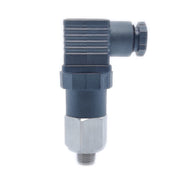Ceramic substrates are the best match for pressure sensors. They are very sturdy and can bear a lot of strain. They perform correctly in hot and cold climates and are not destroyed by chemicals. This makes them excellent for demanding situations like factories, vehicles, and aircraft. These substrates help sensors offer accurate data and endure an extended period. This article will show why these substrates are ideal for pressure gauges. You will learn about their unique skills and how they can boost the quality and lifespan of your sensors.
Why ceramic substrates are used for pressure sensors?
Strong and Durable
These substrates are very tough and durable. These are best for pressure gauges. These are the best match in places like factories, where pressure gauges are in demand. These substrates last for a long time, which gives the sensor durability. And these substrates are hard enough to resist much pressure.
Works Well in Both Cold and Heat
Ceramics can survive in all conditions. It can handle changes in heat and cold. It offers the sensor's exact result no matter the weather. These substrates can be best for vehicles. Also, it can remain the same size no matter how cold or hot the weather is.
Resistant to Chemicals
Chemicals cannot harm these substrates because they are resistant to corrosion… This is vital in areas where sensors may come into contact with hostile materials. Chemical factories are sites where sensors are used. Because ceramics won't react with most chemicals, they need less care and have a long life. This saves money and lowers downtime.
Avoids Electrical Issues
Ceramics are ideal for lowering electrical noise. These don't transmit electricity, which helps sensors create precise readings. This is vital because quality is vital in sectors like aircraft and health care. The coating feature of ceramics also reduces electrical problems like short circuits. It keeps the sensors more secure and reliable.
Stays the Same Shape
These substrates hold their size and form under shifting conditions. This assures the reliability of sensors over time. In sectors like HVAC or production, exact pressure readings are crucial. Ceramic durability helps ensure exact calibration service and reliable results.
Handles Temperature Changes
Ceramics don't grow or shrink wildly with temperature changes. This means sensors deliver accurate data even when temperatures change. In sectors like oil and gas research, this quality is vital. It assures pressure figures are constant and solid, even in demanding settings.
Long-Lasting
Ceramic materials are solid, making them ideal for long-term usage. Ceramic pressure gauges are long-lasting and solid, even in challenging situations. This lowers the need for upgrades, saves money, and improves efficiency. Because of their long lifespan, ceramics are an accessible material for various uses.

These benefits make it an ideal choice. It is best for stable and exact sensor performance in varied conditions.
Which pressure sensor is ideal and has a ceramic substrate?
The XDB100 ceramic pressure sensors are a popular option for various uses. It is highly safe and effective in many situations. This sensor works correctly at multiple temperatures and maintains quality over time. It can deal with temperatures from -40 to +135 °c. The XDB100 may touch the item it gauges and resists most acids, making it highly robust. If you require a strong and reliable pressure gauge, the XDB100 is a perfect choice.
Where can I buy exact pressure sensors with a ceramic substrate?
If you need pressure gauges that are modern, robust, and precise, check out the XIDIBE website. XIDIBE delivers high-quality sensors that work well in many situations. Their gauges are solid and provide exact readings. You can get much data about their items on their web page. They offer great pricing and excellent service to help you find the proper sensor. For great premium pressure gauge offers, visit XIDIBE.
FAQs
What is the reason for using these substrates for this sensor?
They are preferred because they are strong and stable in different temperatures. And they are resistant to damage from chemicals.
How do these substrates improve the accuracy of pressure gauges?
They keep their shape and size, helping sensors give accurate readings.
Can these handle high-pressure environments?
Yes, they are solid and can handle high pressures without breaking.
Can it resist chemicals?
Yes, they resist many chemicals, which helps them last longer.
Does it have the ability to prevent electrical problems?
Yes, they are good insulators and help prevent electrical problems.
In summary
These substrates are excellent for pressure gauges because they are solid. And it can handle heat and harsh conditions well. They help sensors work better and last longer without breaking. This makes them perfect for many different uses, from cars to healthcare. Ceramics make pressure sensors reliable and cost-effective for everyone.



Leave a comment